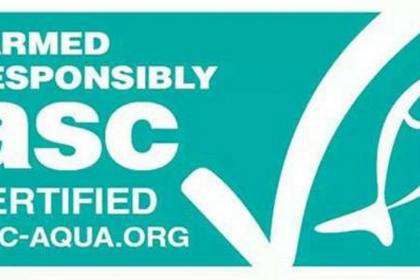ASC鱼场认证
关于ASC(水产养殖管理委员会)
ABOUT ASC (Aquaculture Stewardship Council)
由WWF (世界野生动物基金会) 及IDH (可持续贸易联盟)创立的具有国际影响力的独立非盈利性组织。
Founded in 2010 by WWF and IDH (Dutch Sustainable Trade Initiative) the Aquaculture Stewardship Council (ASC) is an independent not for profit organisation with global influence.
ASC致力于创建的负责任养殖水产品认证和水产品认证标签。其主要角色是管理由世界自然基金会水产养殖对话制定的负责任水产养殖的全球标准。
ASC aims to be the world’s leading certification and labelling programme for responsibly farmed seafood. The ASC’s primary role is to manage the global standards for responsible aquaculture, which were developed by the WWF Aquaculture Dialogues.
迄今为止,ASC 已分别为鲍鱼 (Abalone)、双壳类 (Bivalves)、鲶属 (Pangasius)、三文鱼 (Salmon)、罗非鱼 (Tilapia)、淡水鳟鱼 (Freshwater Trout)及虾 (Shrimp)发布了共7个养殖标准,并通过与MSC共享产销监管链标准保证了ASC产品从认证鱼场到终消费者之间的可追溯性。
Hitherto, ASC has issued 7 separate standards for the aquaculture of Abalone, Bivalves, Pangasius, Salmon, Tilapia, Freshwater Trout and Shrimp. By sharing the Chain of Custody standard issued by MSC, ASC also makes it’s possible to guarantee the traceability of ASC product from certified farm to final consumer.
选择ASC
WHY ASC
水产食品是全世界重要的蛋白质来源之一。水产养殖作为全球增长快的食品系统,我们所食用的半数水产品都来自水产养殖。但是随着该产业的不断扩张,它对环境和社会的影响也在不断扩大。
Aquaculture has the potential to contribute to this global demand. It is the fastest growing animal food producing sector; over 50 per cent of seafood produced for human consumption comes from fish farms. However, as the sector grows so does its impact on the environment and local communities.
ASC认证鱼场证明了其管理良好并将其对环境和社会的影响降到了。作为水产养殖鱼场,参与到ASC项目中将有助:
ASC certified farms demonstrate that they are well managed and minimise adverse environmental and social impacts. As an aquaculture farm, investing in the ASC programme will help you to:
•巩固您在现有市场中的地位并开拓新市场
Strengthen your position in existing markets and tap into new markets.
•通过增强在行业和消费者中的可信度提升市场价值
Enhance market value through greater credibility within the industry and among consumers.
•与行业实践接轨,作为行业领跑者提成竞争优势(例如,通过饲料的利用和疾病的更好控制)
Adopt industry best practices (e.g. through efficient use of feed and the better control of disease) to promote competitive advantage as an industry front-runner.

